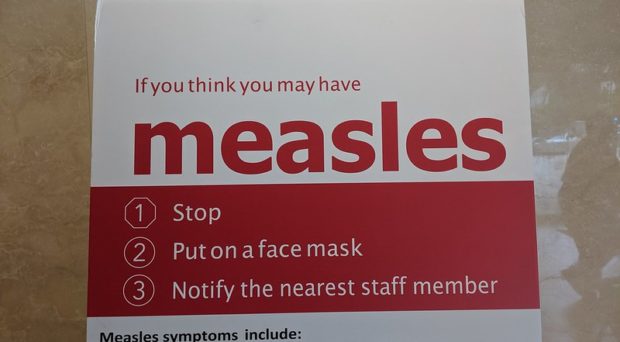
Despite widespread coverage with a highly efficacious vaccine, pockets of under vaccinated populations and imported cases can result in sizable measles outbreaks. And even though measles was declared eliminated in the United States more than 20 years ago, the country has faced a series of large measles outbreaks in the years since, particularly over the past decade.
In our study just published in BMC Public Health, we conducted interviews with individuals from state and local health departments and health systems from across the country who responded to measles outbreaks in 2017-19, representing outbreaks that account for more than 75% of all US measles cases over that period. Our principal aim was to capture firsthand operational experiences in order to generate evidence-based lessons that can inform preparedness activities for future outbreaks of measles and other highly transmissible diseases.
This study took place under the umbrella of a larger initiative, Outbreak Observatory, which seeks to address the operational challenges and barriers faced during outbreak responses and disseminate lessons to facilitate future preparedness and response efforts. Outbreak responses tend to be busy times that do not lend themselves to documenting operational knowledge acquired during the response. Outbreak Observatory aims to provide a forum to aggregate those lessons so that other jurisdictions can put them into practice without having to learn them firsthand. Previous Outbreak Observatory studies—including on the 2017-18 US hepatitis A epidemic and the impact of Candida auris and the 2017-18 influenza season on US health systems—identified lessons that reach beyond those individual responses to inform broader outbreak and epidemic preparedness. As highlighted by the complexities of the COVID-19 pandemic response, it is critical to share the wealth of operational experience held by frontline responders to improve outbreak response readiness and capacity in advance of future communicable disease events.
Even for the smaller outbreaks, health departments faced considerable challenges conducting routine outbreak response activities, such as contact tracing
The participants in our study on US measles outbreaks called attention to a number of resource and operational gaps during their response operations that apply directly to the COVID-19 pandemic. While some of these outbreaks were quite large, none even remotely compared to the scale of the US COVID-19 epidemic. Even for the smaller outbreaks, health departments faced considerable challenges conducting routine outbreak response activities, such as contact tracing. These gaps became front-page news with COVID-19, as health departments around the country struggled to implement effective testing, contact tracing, and other surveillance operations during the pandemic. Additionally, most health departments interviewed in this study indicated that they did not have the resources available to conduct mass vaccination operations in response to the outbreak. Rather, they relied heavily on healthcare providers and pharmacists in the community to administer the vaccinations.
Public health preparedness funding has decreased steadily over the past decade or longer, and health departments are unable to maintain the programs and personnel required to respond to even minor outbreaks, let alone major epidemics or pandemics.
As we have observed during the COVID-19 response—first with mass testing clinics and currently with vaccinations—health departments need considerable external resources to stand up large-scale responses for major epidemics. Public health preparedness funding has decreased steadily over the past decade or longer, and health departments are unable to maintain the programs and personnel required to respond to even minor outbreaks, let alone major epidemics or pandemics.
As with the outbreaks included in this study, many of which occurred largely in insular communities—eg, racial/ethnic minorities, immigrants, orthodox religious communities—COVID-19 has disproportionately impacted vulnerable racial and ethnic minority communities. Public health and healthcare organizations faced significant barriers to encouraging vaccination among the affected communities, and we are currently observing similar challenges as the availability of SARS-CoV-2 vaccines scales up and eligibility groups expand. During the measles outbreaks, health officials often relied on community healthcare providers, particularly those that serve vulnerable and insular communities, to engage with the affected community. Additionally, trusted community leaders—including religious leaders, business owners, and community-based organizations—played a critical role as trusted voices to disseminate accurate information regarding protective measures, including vaccination. It requires substantial time and resources to develop these relationships, however, and it can be very difficult to do so in the midst of an outbreak or epidemic response. Health departments that had previously established relationships (e.g., from previous outbreaks) found it easier to leverage these community leaders to make a positive impact.
Historically, most outbreak research focuses on the disease epidemiology or clinical care or is limited to after-action reports that focus on organizational challenges and may never be published publicly
Historically, most outbreak research focuses on the disease epidemiology or clinical care or is limited to after-action reports that focus on organizational challenges and may never be published publicly. It is critical to understand the operational experiences of frontline responders, including public health and healthcare organizations, and to translate those experiences into evidence-based lessons that can inform other preparedness efforts. Without these lessons, the jurisdictions repeat the same mistakes and must learn those lessons firsthand. And the challenges, barriers, and shortcomings identified during smaller outbreaks will only be exacerbated during larger events.
Efforts to document and disseminate these operational experiences, like Outbreak Observatory and others, support the development of programs and policies that can enable sustainable public health preparedness capacity that is needed for a range of communicable disease events, from smaller outbreaks to larger health emergencies like COVID-19.
Comments